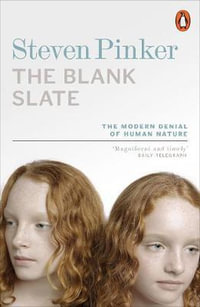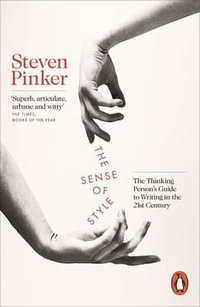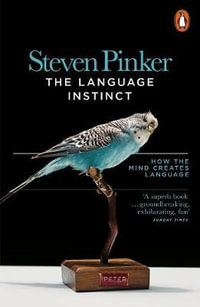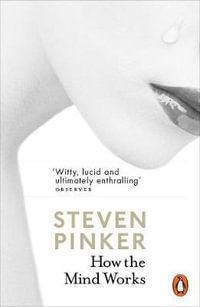
The Blank Slate
The Modern Denial of Human Nature
By: Steven Pinker
Paperback | 5 June 2003 | Edition Number 1
At a Glance
560 Pages
2.7 x 13 x 19.7
Paperback
RRP $27.99
$26.50
or 4 interest-free payments of $6.63 with
Aims to ship in 5 to 10 business days
Steven Pinker's profound and essential book shows that this view denies the heart of our being: human nature. We are prepared for sex, aggression and jealousy - and also love, compassion and reason. Violence is not just a product of society; male and female minds are different; the genes we give our children shape them more than our parenting practices.
To acknowledge our nature, Pinker shows, is not to condone inequality or callousness, but ultimately to understand the very foundations of humanity.
Critic Review:
‘A magnificent and timely work’ Fay Weldon, Daily Telegraph, Books of the Year
‘A passionate defence of the enduring power of human nature … both life-affirming and deeply satisfying’ Tim Lott, Daily Telegraph, Books of the Year
‘Brilliant … enjoyable, informative, clear, humane’ New Scientist
‘If you think the nature–nurture debate has been resolved, you are wrong. It is about to be reignited with a vengeance … this book is required reading’ Literary Review
‘An original and vital contribution to science and also a rattling good read’ Matt Ridley, Sunday Telegraph
‘Startling … Pinker makes his main argument persuasively and with great verve … This is a breath of air for a topic that has been politicized for too long’ Economist
About the Author
Steven Pinker is one of the world's leading authorities on language and the mind. His popular and highly praised books include The Stuff of Thought, The Blank Slate, Words and Rules, How the Mind Works, and The Language Instinct. The recipient of several major awards for his teaching, books, and scientific research, Pinker is Harvard College Professor and Johnstone Family Professor of Psychology at Harvard University. He also writes frequently for The New York Times, Time, The New Republic, and other magazines.
Industry Reviews
Brilliant ... enjoyable, informative, clear, humane * New Scientist *
If you think the nature-nurture debate has been resolved, you are wrong ... this book is required reading * Literary Review *
An original and vital contribution to science and also a rattling good read -- Matt Ridley * Sunday Telegraph *
"Blank slate" is a loose translation of the medieval Latin term tabula rasa, literally, "scraped tablet." It is commonly attributed to the 17th century philosopher John Locke (1632-1704), though in fact he used a different metaphor. Here is the famous passage from An Essay Concerning Human Understanding:
Let us then suppose the mind to be, as we say, white paper void of all characters, without any ideas. How comes it to be furnished? Whence comes it by that vast store which the busy and boundless fancy of man has painted on it with an almost endless variety? Whence has it all the materials of reason and knowledge? To this I answer, in one word, from EXPERIENCE.
Locke was aiming at contemporary theories of innate ideas in which people are born with concepts such as God, mathematical ideals, and eternal truths. His alternative theory, empiricism, was intended both as a theory of psychology-how the mind works-and as a theory of epistemology-how we come to know the truth. Both goals helped to motivate his political philosophy, often honored as the foundation of liberal democracy. Locke opposed dogmatic justifications for the political status quo, such as the authority of the church and the divine right of kings, which had been touted as self-evident truths. He argued that social arrangements should be reasoned out from scratch and agreed upon by mutual consent, based on knowledge that any person could acquire. Since ideas are grounded in experience, which vary from person to person, differences of opinion arise not because one mind is equipped to grasp the truth and another is defective, but because the two minds had different histories. Those differences therefore ought to be tolerated rather than suppressed. The Blank Slate also undermined a hereditary royalty and aristocracy, whose members could claim no innate wisdom or merit if their minds had started out as blank as everyone else's. It also spoke against the institution of slavery, because slaves could no longer be thought of as innately inferior or subservient.
In the twentieth century the Blank Slate set the agenda for much of the social sciences and humanities. As we shall see, psychology has sought to explain all of thought, feeling, and behavior with a few simple mechanisms of learning. The social sciences have sought to explain social customs arrangements as a product of the socialization of children by the surrounding culture: a system of words, images, stereotypes, role models, and contingencies of reward and punishment. A long and growing list of concepts that would seem natural to the human way of thinking (emotions, kinship, the sexes, illness, nature, the world), are now said to have been "invented" or "socially constructed."
The Blank Slate has also served as a sacred scripture for political and ethical beliefs. Any differences we see among races, ethnic groups, sexes, and individuals come not from differences In their innate constitution but from differences in their experiences. Change the experiences-by reforming parenting, education, the media, and social rewards-and you can change the person. Underachievement, poverty, and antisocial behavior can be ameliorated; indeed, it is irresponsible not to do so. And discrimination on the basis of purportedly inborn traits of a sex or ethnic group is simply irrational.
The Blank Slate is often accompanied by two other doctrines, which have also attained a sacred status in modern intellectual life. My label for the second one is commonly attributed to the philosopher Jean-Jacques Rousseau (1712-1778), though it really comes from John Dryden's The Conquest of Granada, published in 1670:
I am as free as Nature first made man,
Ere the base laws of servitude began,
When wild in woods the noble savage ran.
The concept of the noble savage was inspired by the discovery of indigenous peoples by European colonists in the Americas and Africa and later, Oceania. It captures the belief that humans in their natural state are selfless, peaceable, and untroubled, and that greed, violence, anxiety, and other blights are products of civilization. In 1755 Rousseau wrote:
So many authors have hastily concluded that man is naturally cruel, and requires a regular system of police to be reclaimed; whereas nothing can be more gentle than him in his primitive state, when placed by nature at an equal distance from the stupidity of brutes and the pernicious good sense of civilized man . . . The more we reflect on this state, the more convinced we shall be that it was the least subject of any to revolutions, the best for man, and that nothing could have drawn him out of it but some fatal accident, which, for the public good, should never have happened. The example of the savages, most of whom have been found in this condition, seems to confirm that mankind was formed ever to remain in it, that this condition is the real youth of the world, and that all ulterior improvements have been so many steps, in appearance towards the perfection of individuals, but in fact towards the decrepitness of the species.
First among the authors that Rousseau had in mind was Thomas Hobbes (1588-1679), who had famously claimed the opposite:
Hereby it is manifest that during the time men live without a common power to keep them all in awe, they are in that condition which is called war; and such a war as is of every man against every man . . .
In such condition there is no place for industry, because the fruit thereof is uncertain: and consequently no culture of the earth; no navigation, nor use of the commodities that may be imported by sea; no commodious building; no instruments of moving and removing such things as require much force; no knowledge of the face of the earth; no account of time; no arts; no letters; no society; and which is worst of all, continual fear, and danger of violent death; and the life of man, solitary, poor, nasty, brutish, and short.
Hobbes believed that people could escape this hellish existence only by surrendering their autonomy to a sovereign person or assembly. He called it a Leviathan, the Hebrew word for a monstrous sea creature subdued by Yahweh at the dawn of creation.
Much depends on which of these armchair anthropologists is correct. If people are noble savages, then a domineering Leviathan is unnecessary. Indeed, by forcing people to delineate private property for the state to recognize-property they might otherwise have shared-it creates the very greed and belligerence it is designed to control. A happy society would be our birthright; all we need to do is eliminate the institutional barriers that keep it from us. If, in contrast, people are naturally nasty, the best we can hope for is an uneasy truce enforced by the police and army. The two theories have implications for private life as well. Every child is born a savage, so if savages are naturally gentle, childrearing is a matter of providing children with opportunities to develop their potential, and evil people are products of a society that has corrupted them. If savages are naturally nasty, then childrearing is an arena of discipline and conflict, and evil people are showing a dark side that was insufficiently tamed.
The actual writings of philosophers are always more complex than the theories they come to symbolize in the textbooks. In reality, the views of Hobbes and Rousseau are not that far apart. Rousseau, like Hobbes, believed (incorrectly) that savages were solitary, without ties of love or loyalty, and without any industry or art, and he may have out-Hobbes'd Hobbes in claiming they did not even have language. Hobbes envisioned- indeed, literally drew-Leviathan as an embodiment of the collective will, vested in it by a kind of social contract; Rousseau's most famous work is called The Social Contract, in which he calls on people to subordinate their interests to a "general will."
Nonetheless, Hobbes and Rousseau limned contrasting pictures of the state of nature that have inspired thinkers in the centuries since. No one can fail to recognize the influence of the doctrine of the Noble Savage in contemporary consciousness: the respect for all things natural and the distrust of the man-made (natural foods, natural medicines, natural child-birth); the unfashionability of authoritarian styles of child-rearing and education; the understanding of social problems as repairable defects in our institutions rather than tragedies inherent to the human condition.?
The other scared doctrine that often accompanies the Blank Slate is usually attributed to the scientist, mathematician, and philosopher René Descartes (1596-1650):
There is a great difference between mind and body, inasmuch as body is by nature always divisible, and the mind is entirely indivisible . . . When I consider the mind, that is to say, myself inasmuch as I am only a thinking being, I cannot distinguish in myself any parts, but apprehend myself to be clearly one and entire; and though the whole mind seems to be united to the whole body, yet if a foot, or an arm, or some other part, is separated from the body, I am aware that nothing has been taken from my mind. And the faculties of willing, feeling, conceiving, etc. cannot be properly speaking said to be its parts, for it is one and the same mind which employs itself in willing and in feeling and understanding. But it is quite otherwise with corporeal or extended objects, for there is not one of them imaginable by me which my mind cannot easily divide into parts . . . This would be sufficient to teach me that the mind or soul of man is entirely different from the body, if I had not already been apprised of it on other grounds.
A memorable name for this doctrine was given much later by a detractor, the philosopher Gilbert Ryle (1900-1976):
There is a doctrine about the nature and place of minds which is so prevalent among theorists and even among laymen that it deserves to be described as the official theory . . . The official doctrine, which hails chiefly from Descartes, is something like this. With the doubtful exception of idiots and infants in arms every human being has both a body and a mind. Some would prefer to say that every human being is both a body and a mind. His body and his mind are ordinarily harnessed together, but after the death of the body his mind may continue to exist and function. Human bodies are in space and are subject to mechanical laws which govern all other bodies in space . . . But minds are not in space, nor are their operations subject to mechanical laws . . .
. . .? Such in outline is the official theory. I shall often speak of it, with deliberate abusiveness, as "the dogma of the Ghost in the Machine."
With the Ghost in the Machine, as with the Noble Savage, Hobbes is the villain, because he had argued that life and mind could be explained in mechanical terms. According to Hobbes, light sets our nerves and brain in motion, and that is what it means to see. The motions may persist like the wake of a ship or the vibration of a plucked string, and that is what it means to imagine. Quantities get added or subtracted in the brain, and that is what it means to think.
Descartes rejected the idea that the mind could possibly operate by physical principles. He thought that behavior, especially speech, was not caused but freely chosen. He observed that our consciousness, unlike our bodies and other physical objects, does not feel as if it is divisible into parts or laid out in space. He noted that we cannot doubt the existence of our minds- indeed we cannot doubt that we are our minds-because the very act of thinking presupposes that our minds exist. But we certainly can doubt the existence of our bodies, because we can imagine ourselves as immaterial spirits who merely dream or hallucinate that we are incarnate. He also found a moral bonus in his dualism:
There is none which is more effectual in leading feeble spirits from the straight path of virtue, than to imagine that the soul of the brute is of the same nature as our own, and that in consequence, after this life we have nothing to fear or to hope for, any more than the flies and the ants.
Ryle believes that Descartes's dualism helped him deal with an intellectual dilemma: "When Galileo showed that his methods of scientific discovery were competent to provide a mechanical theory which should cover every occupant of space, Descartes found in himself two conflicting motives. As a man of scientific genius he could not but endorse the claims of mechanics, yet as a religious and moral man he could not accept, as Hobbes accepted, the discouraging rider to those claims, namely that human nature differs only in degree of complexity from clockwork."
It indeed can be upsetting to think of ourselves as glorified gears and springs. Machines are insensate, built to be used, and disposable; humans are sentient, possessing of dignity and rights, and infinitely precious. Machines have some workaday purpose such as grinding grain or sharpening pencils; humans have higher purposes such as love, worship, good works, and the creation of knowledge and beauty. The behavior of machines is determined by the ineluctable laws of physics and chemistry; the behavior of people is freely chosen. With choice comes freedom, and therefore optimism about our possibilities for the future. With choice also comes responsibility, which allows us to hold people accountable for their actions. And of course if the mind is separate from the body, it can continue to exist when the body breaks down, and our thoughts and pleasures will not some day be snuffed out forever.
As I mentioned, most Americans continue to believe in an immortal soul made of some nonphysical substance which can part company with the body. But even those who do not avow that belief in so many words still imagine that somehow there must be more to us than electrical and chemical activity in the brain. Choice, dignity, and responsibility are gifts that set off human beings from everything else in the universe, and seem incompatible with the idea that we are mere collections of molecules. Attempts to explain behavior in mechanistic terms are commonly denounced as "reductionist" or "determinist." No one really knows what these words mean, but everyone knows they reduce people to something inhuman and are bad. The dichotomy between mind and body also pervades everyday speech, as when we tell someone to "use his head," refer to "out of body experiences," and speak of "John's body," or for that matter "John's brain," which presupposes an owner, John, that is somehow separate from the brain it owns. Writers sometimes speculate about "brain transplants," when they really should be calling them body transplants, because as the philosopher Dan Dennett has noted, a brain transplant is the one such operation in which it is better to be the donor than the recipient.
The doctrines of the Blank Slate, the Noble Savage, and the Ghost in the Machine-or as philosophers call them, empiricism, romanticism, and dualism-are logically independent, but in practice they are often found together. If the slate is blank, then strictly speaking it has neither injunctions to do good nor injunctions to do evil. But good and evil are asymmetrical; there are more ways to harm people than to help them, and harmful acts can hurt them to a greater degree than virtuous acts can make them better off. So a blank slate, compared to one filled with motives of all kinds, is bound to impress us more by its inability to do harm than its inability to do good. Rousseau did not literally believe in a blank slate, but he did believe that bad behavior is a product of learning and socialization. "Men are wicked; a sad and constant experience makes proof unnecessary," he wrote. But this wickedness comes from society: "There is no original perversity in the human heart. There is not a single vice to be found in it of which it cannot be said how and whence it entered."" If the metaphors in everyday speech are a clue, then all of us, like Rousseau, associate blankness with virtue rather than with nothingness. Just think of the moral connotations of the adjectives clean, fair, immaculate, lily-white, pure, spotless, unmarred, and unsullied, and of the nouns blemish, blot, mark, stain, and taint.
A blank slate is also a hospitable machine for a ghost to inhabit. If a ghost is to control the machine, the factory can ship it with a minimum of parts. The ghost can read the body's display panels and pull its levers, with no need for a high-tech executive program, guidance system, or CPU. The more not-clockwork there is controlling behavior, the less clockwork we need to posit.
For similar reasons, the Ghost in the Machine happily coexists with the Noble Savage. If the machine behaves ignobly, we can blame the ghost, which freely chose to carry out the iniquitous acts. We need not probe for a defect in the machine's design. For these reasons, I will sometimes use the Blank Slate as an umbrella term that encompasses the Noble Savage and the Ghost in the Machine as well.
Philosophy today gets no respect. Many scientists use the term as a synonym for effete speculation. When my colleague Ned Block told his father that he would major in the subject, his reply was, "Luft!," Yiddish for "air." And according to the joke, when a young man told his mother he would become a Doctor of Philosophy, she said "Wonderful! But what kind of disease is philosophy?"
But far from being idle or airy, the ideas of philosophers can have repercussions for centuries. The doctrines making up the Blank Slate have infiltrated the conventional wisdom of our civilization and repeatedly surface in unexpected places. William Godwin (1756-1835), one of the founders of liberal political philosophy, wrote that "children are a sort of raw material put into our hands," their minds "like a sheet of white paper." More sinisterly, we find Mao Zedong justifying his radical social manipulation by saying, "It is on a blank page that the most beautiful poems are written." Even Walt Disney was inspired by the metaphor: "I think of a child's mind as a blank book," he wrote. "During the first years of his life, much will be written on the pages. The quality of that writing will affect his life profoundly."
Locke could not have imagined that his words would some day lead to Bambi (intended by Disney to teach self-reliance); nor could Rousseau have anticipated Pocahontas, the ultimate noble savage. Indeed, the soul of Rousseau seems to have been channelled by the writer of a recent Thanksgiving op-ed piece in the Boston Globe:
I would submit that the world native Americans knew was more stable, happier, and less barbaric than our society today . . . there were no employment problems, community harmony was strong, substance abuse unknown, crime nearly nonexistent. What warfare there was between tribes was largely ritualistic and seldom resulted in indiscriminate or wholesale slaughter. While there were hard times, life was, for the most part, stable and predictable . . . Because the native people respected what was around them, there was no loss of water or food resources because of pollution or extinction, no lack of materials for the daily essentials, such as baskets, canoes, shelter, or firewood.
The third doctrine, too, continues to make its presence felt in modern times. In 2001 George W. Bush announced that the American government would not fund research on human embryonic stem cells if scientists have to destroy new embryos to extract them (the policy allows research on stem cell lines that had been extracted from embryos beforehand). He derived the policy after consulting not just with scientists but with philosophers and religious thinkers. Many of them frame the moral problem in terms of "ensoulment," the moment at which the cluster of cells that will grow into a child is endowed with a soul. Some argue that ensoulment occurs at conception, which implies that the blastocyst (the five-day-old ball of cells from which stem cells are derived) is morally like a person, and that destroying it is a form of murder. That argument proved decisive, which means that the American policy on perhaps the most promising medical technology of the twenty-first century was decided by pondering the moral issue as it might have been framed centuries before: when does the ghost first enter the machine?
There are just a few of the fingerprints of the Blank Slate, the Noble Savage, and the Ghost in the Machine on modern intellectual life. In the following chapters we will see how the seemingly airy ideas of Enlightenment philosophers entrenched themselves in modern consciousness, and the fallout from discoveries that are casting those ideas in doubt.
Interview
Steven Pinker's The Blank Slate exposes the nature nurture debate and examines the very foundation of human identity. Pinker argues that intellectuals have ignored what we are when talking about who we are, denying what is at the very heart of our being - our innate human nature. In an exclusive interview Steven Pinker talks candidly about Chomsky's profound influence on his work, challenges comparisons between himself and Freud, and reveals his top five films.
How much of an influence was Chomsky on you? What does he think of your recent work? Does The Blank Slate represent a willingness on your part to enter into more political areas of debate?
I never studied with Chomsky, though I did attend lectures by him when I was in graduate school down the river at Harvard. We are colleagues at MIT, though in different departments. We both study language, though using the tools and standards of different fields (I am a psychologist, he is a linguist). Intellectually, Chomsky influenced me in at least two profound ways: his treatment of language as a product of mental computation rather than as a free-standing cultural system, and his focus on the innate endowment of the child that makes language acquisition possible.
We differ in important ways as well. I believe that language, and human nature in general, should be understood in a Darwinian framework, whereas Chomsky does not believe that evolutionary biology provides much if any insight. As such our conceptions of human nature - and perhaps, as a result, our politics - differ. Chomsky has a more romantic, young-Marxian view of human nature as being dominated by innate impulses toward creativity, cooperation, and social solidarity, which ties into his 'libertarian socialist' and 'anarcho-syndicalist' politics. I take a more jaundiced view of human nature, which is more compatible with a classical liberal sympathy toward conventional democracy and market economies.
Do you think The Blank Slate will be more controversial to American readers where evolutionary theory has perhaps been slower to permeate popular thinking? How long will it take our intellectual communities to weed out the fallacies of the noble savage, the ghost in the machine and the blank slate from their thinking?
Yes, I think that the traditional American antipathy to evolution, partly influenced by the fundamentalist religious right, will make the book more controversial in the US than in the UK. Another reason is the greater American sensitivity to issues surrounding race, which makes any kind of innatism seem to veer too close for comfort to hypotheses about innate racial differences. As to how long it will take for the fallacies to be weeded out - well, as the American baseball legend Yogi Berra said, 'predictions are difficult, especially about the future.'
Are you confident that evolutionary psychology will soon provide an account of human nature that is satisfactorily scientific? How do you refute comparisons between evolutionary psychology and Freudian psychology of a century ago, which suggest that Freud's 'unconscious' is akin to evolutionary psychology's 'human nature' and the definition of 'human nature' is only slightly less arbitrary?
Yes, I am confident. The comparison with Freud is just wrong. First, evolutionary psychology is grounded in well-established principles of evolutionary biology and cognitive science, whereas psychoanalysis was grounded in Lamarckism, nineteenth-century hydraulic models of the mind, and Freud's idiosyncratic beliefs. Second, the hypotheses from evolutionary psychology are testable and routinely tested, whereas Freud's were notoriously unfalsifiable. When Freud predicted that little boys have an unconscious desire to have sex with their mothers, you had to take it or leave it. In contrast, when Donald Symons predicted that geometrically average faces should be more sexually attractive, evolutionary psychologists got out their computers, generated morphed faces, showed them to people, and measured their judgments of how attractive they were.
You have said that 'a gene for x' is just shorthand for 'in comparison with it's alternative allele, averaged over the environments it appears in, robabalistically leads to more behaviour x, being solicitous in to one's children.' How important is it that science makes itself properly understood to the wider public? Are there any limits in your opinion to the extent to which science can be ethically prescriptive rather than empirically descriptive?
Actually, I never said that - what I said was that 'a gene for x' is 'a gene that increases the probability of a behaviour compared with alternative genes at that locus. And that probability is an average computed over the other genes that have accompanied it over evolutionary time, and over the environments that the organisms possessing the gene have lived in.' Now, a given gene may not have the same effect in all environments, nor the same effect in all genomes, but it has to have an average effect. That average is what natural selection selects (all things being equal), and that is all that the 'for' means in 'a gene for X.'
It is vitally important that science make itself properly understood to the wider public for two reasons. First, science is simply an understanding of the world (including us), and it's always better to understand things than to be ignorant or confused about them. Second, science confronts us with challenges to our belief systems, and with new technologies, and we have to understand these innovations in order to deal wisely with them.
A major theme of The Blank Slate is that science, by itself, cannot be ethically prescriptive at all - it can only be empirically descriptive. Ethical judgments require both scientific facts and human values, which cannot be dictated by science (though they can be informed by it).
In what ways have you answered Jerry Fodor's criticisms of How The Mind Works, more specifically; 1) Massive modularity - whether the mind is modular to the extent you suggest, and moreover, how do you account for the overall integration of information. Rose has pointed out that both yourself and Dawkins claim to be able to act morally, independently of genetic impulses. What implements the logic of morality that you refer to? 2) The methodology of reverse engineering. Doesn't the function of the system you are trying to reverse engineer need to be known? Isn't the function of the mind missing from our account? 3) Are there not alternative explanations for the evolution of the complexity of the mind?
Fodor misunderstood How the Mind Works. He thought I was positing 'mental modules' in his own narrow and idiosyncratic sense of discrete, informationally encapsulated processing systems - like computer chips with a few pins for input and output. In fact I was positing only that the mind is a complex system with specialized parts, much like the body. The blood, the lymphatic system, and the skin are specialized organs, but they are not encapsulated in little boxes; they interact with other body parts in complex ways. So it is with mental subsystems like language, intuitive physics, intuitive psychology, and other specializations - they are not 'modules' in Fodor's sense, but I never found that sense useful to start with.
Rose is even more confused. My point was not that some mysterious 'I' can overcome the biological impulse to reproduce my genes. My point was that there is no biological impulse to reproduce one's genes to begin with. It is sometimes useful to think of evolutionary processes by thinking of the genes as having the 'metaphorical' goal of making copies of themselves. People like Rose misunderstand that as implying that people have the 'real' goal of making copies of their genes. With the exception of a few kooks like the American fertility doctor that secretly impregnated his patients with his own semen, no one has that goal. People's genes give them a brain that makes them love sex and love their children, and that's how the genes make copies of themselves. More accurately, 'made' copies of themselves, because in an evolutionarily novel environment in which sex no longer leads to children, people's goals and gene replication no longer go together. As for the logic of morality, it is implemented the way that other human aptitudes and inclinations are implemented - the genes structure the growing brain in certain ways, which then processes information from the environment in certain ways.
Regarding reverse-engineering. In How the Mind Works, I was completely explicit about the function of the mind. Its ultimate (evolutionary) function, like the function of all biological adaptations, is to make copies of the genes that shaped it. But remember that the 'ultimate function' of an organ is not the same as the way it works (in the case of the brain, the goals it gives us). The brain fulfills its evolutionary function by pursuing the goals of safety, know-how, cooperation, mating, allies, child-rearing, and a few others. Yes, we have to study humans to discover some of these functions rather than deducing them all from the armchair, but that doesn't make the science circular, because one doesn't invent a new function for each behaviour; rather, a vast range of behaviour can be predicted from a small list of functions.
No, there are no scientifically viable alternative explanations for the complexity of the mind. Creationism is false. Social constructionism is incoherent without some notion of the innate structures of the mind that make social construction possible in the first place. 'Complexity theory,' according to its proponents, can at best complement the theory of natural selection; it cannot replace it.
What will your next work be focusing on?
My next book project is to edit the collection "Best Science and Nature Writing 2003." But most of my writing over the next few years will be write-ups for journals of my research on language - in particular, how children learn, and how the brain handles, regular and irregular verbs.
What are your five favourite books of all time?
Oh, gee. Here are five that pop into mind. I might give a different list
tomorrow.
- George Orwell's Nineteen Eighty-Four
- Richard Dawkins' The Blind Watchmaker
- Isaac Bashevis Singer's Enemies: A Love Story
- Thomas Sowell's A Conflict of Visions
- Donald Symons' The Evolution of Human Sexuality
What are your five favourite albums of all time?
Oh, no! Let's see, how about ...
- Ella Fitzgerald, The Cole Porter Songbook
- Miles Davis, Kind of Blue
- Elvis Costello, King of America
- Van Morrison, Moondance
- Derek and the Dominoes, Layla
And your three favourite films?
I'm going to sneak in five:
- Enemies
- A Love Story
- The Godfather I and II
- A tie: North by Northwest and Rear Window.
Mozart or Beethoven? Beethoven
Burger or caviar? Burger
Summer or Spring? Summer
The Beatles or The Stones? The Beatles
Wine or beer? Beer
Sean Connery or Steve McQueen? Sean Connery
Opera or musical? Musical
Tea or coca-cola? Tea (I'm Canadian)
The past or the future? The future
Snow or sand? Sand (I had enough snow growing up in Montreal)
Lecture or seminar? Lecture
Thanks to James Mercer from Blackwell's as being the interviewer. The interview is derived from the September edition of Blackwell's magazine.
Fear and loathing: political scientists; the Holy Trinity.
Human nature with a human face: the fear of inequality; the fear of imperfectability; the fear of determinism; the fear of nihilism.
Know thyself: in touch with reality; out of our depths; the many roots of our suffering; the sanctimonious animal.
Hot buttons: politics; violence; gender; children; the arts.
The voice of the species.
Appendix: Donald E. Brown's list of human universals.
ISBN: 9780140276053
ISBN-10: 014027605X
Series: Penguin Press Science
Published: 5th June 2003
Format: Paperback
Language: English
Number of Pages: 560
Audience: General Adult
Publisher: Penguin UK
Country of Publication: GB
Edition Number: 1
Dimensions (cm): 2.7 x 13 x 19.7
Weight (kg): 0.38
Shipping
| Standard Shipping | Express Shipping | |
|---|---|---|
| Metro postcodes: | $9.99 | $14.95 |
| Regional postcodes: | $9.99 | $14.95 |
| Rural postcodes: | $9.99 | $14.95 |
How to return your order
At Booktopia, we offer hassle-free returns in accordance with our returns policy. If you wish to return an item, please get in touch with Booktopia Customer Care.
Additional postage charges may be applicable.
Defective items
If there is a problem with any of the items received for your order then the Booktopia Customer Care team is ready to assist you.
For more info please visit our Help Centre.





